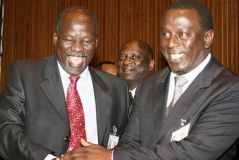Darfur rebels Should attend peace talks or face sanctions
September 21, 2007 (UNITED NATIONS) — Participants at a UN-sponsored high-level meeting here Friday urged all Darfur rebel groups to attend crucial peace talks with Khartoum scheduled in Libya next month or face sanctions.
 “Participants confirmed their support for the (Libya) talks and expressed strong expectations that the negotiations would be inclusive and decisive, stressing that the parties should seize this unique opportunity to resolve the conflict,” read a joint statement issued at the end of the one-day meeting.
“Participants confirmed their support for the (Libya) talks and expressed strong expectations that the negotiations would be inclusive and decisive, stressing that the parties should seize this unique opportunity to resolve the conflict,” read a joint statement issued at the end of the one-day meeting.
Sudanese Foreign Minister Lam Akol, calling Friday’s ministerial session “successful,” stressed the fact that “any party that does not participate in the (Tripoli) talks or obstruct the peace process will be faced with firm punitive measures.”
US Deputy Secretary of State John Negroponte also said after the meeting that those rebel groups which would refuse to go to Tripoli for the talks scheduled for October 27 would face “sanctions.”
“If an important rebel group chooses not to attend, not to send a representative (to Tripoli), that should not be a cost-free choice,” he said. “We are prepared to put sanctions. The notion of sanctions is not limited to the (Khartoum) government alone. It also relates to rebel groups’ leaders.”
Negroponte added that US envoy to Sudan Andrew Natsios would attend the Tripoli meeting.
UN chief Ban Ki-moon secured Libya’s agreement to host the Darfur peace talks during his week-long trip to Sudan, Chad and Libya early is month.
On Thursday Ahmed Abdel Shafi, head of the Sudan Liberation Movement (SLM) — a major Darfur rebel group — called for the Tripoli talks to be delayed, saying a ceasefire must first take hold in the war-ravaged region.
The Tripoli meeting aims to broaden the Darfur peace agreement (DPA) signed in May 2006 between Khartoum and the main Darfur rebel movement to include those groups which did not sign it.
French Foreign Minister Bernard Kouchner meanwhile deplored hardline Darfur rebel chief Abdel Wahid Mohammed Nur’s refusal to take part in peace talks with Khartoum until after the full deployment of UNAMID and effective security for Darfurians.
Nur, who lives in exile in Paris, “does not want (to go to Tripoli),” Kouchner told reporters.
Kouchner stressed that he could not expel Nur.
The French minister expressed confidence that the Tripoli meeting would take place as scheduled.
The African Union and the United Nations, which co-chaired Friday’s closed-door ministerial session, also appealed for support for their efforts to ensure the speedy deployment of a 26,000-strong joint AU-UN force to take over peacekeeping from nearly 6,000 under-equipped and under-funded AU troops.
Friday’s meeting, chaired by Ban and Alpha Oumar Konare, the head of the AU Commission, brought together ministers or senior officials of nearly 30 countries or regional bodies taking part.
The UN and the UN underscored the importance of deploying a force “that would be able to effectively fulfill its mandate and which would have an immediate positive impact in Darfur, while reiterating their commitment to ensuring the predominantly African character” of the AU-UN force.
Khartoum has insisted that the force, known as UNAMID, be made up mostly of African troops.
“Some of the non-African countries can make a very valuable contribution that would not violate the principle of a predominantly African force,” Negroponte said. “We don’t think Sudan has anything to be afraid of.”
The African Union and the United Nations also stressed “the critical importance of receiving sustained support from the government of Sudan on operational issues, including the land for the building of UNAMID (the joint UN-AU force) camps, provision of airport landing rights for heavy aircraft, clearance for night flights, an agreement to drill for water, and full freedom of movement for the operation.”
They expressed concern about the continuing violence in the Darfur as well as about “the continuing fragmentation” of rebel groups which did not sign the DPA and the “deterioration in the humanitarian situation” in Darfur.
According to UN estimates, more than 200,000 people have died and some two million have been displaced in Darfur as a result of the combined effect of war and famine since the conflict erupted more than four years ago.
(AFP)

Bob Tata
Darfur rebels Should attend peace talks or face sanctions
hi there!
Is Dr Akol at his right mind! Because he smiles too much even at the things that do not deserve smiling but grieving rather! Is that a fashion or anxiety? So, for Lam’s associates could you please inform Dr Akol about that disturbing habit?
thnks
Bol Thourmuck